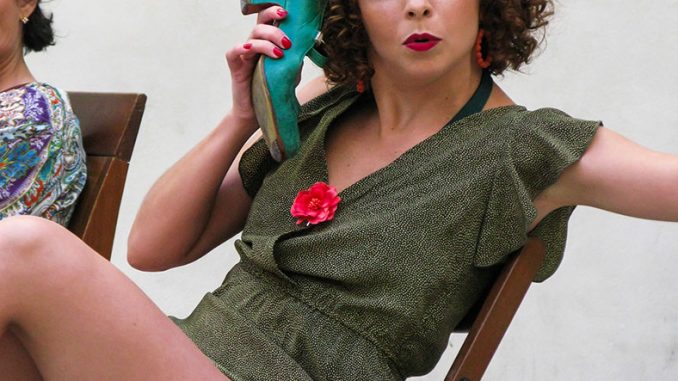

From a street-side glance, the three-story stone Tudor that stands at 6411 Overbrook Ave. fits in seamlessly with its neighbors. Tucked away on the western edge of city limits, its hedged walkways and wrap-around porch present the familiarities of suburbia.
Out back, however, it’s a different story. That’s where flamenco is practiced.
In the white garage bordering her backyard’s property line, homeowner Elba Hevia y Vaca’s dance company, Pasión y Arte, has been holding flamenco classes since 2000.
This month, however, Hevia y Vaca’s studio will also play host to the creative development of Philadelphia’s second biannual Flamenco Festival, a series of performances, lectures and classes presented by Pasión y Arte from March 1-16.
Funded by grants from the Pew Center for Arts and Heritage and the Knight Foundation, this festival provided Hevia y Vaca with the means to introduce her audience to the traditions that define flamenco, as well as her contemporary take on the art form.
Flamenco was born out of the oppression faced by the Gypsies, Moors and Jews of Spain during their 1492 expulsion by a Catholic monarchy. Today, flamenco still carries these emotional roots.
Flamenco combines four components to produce this effect: singing, clapping, guitar and dance.
The intensity of flamenco is what Hevia y Vaca said drew her to the art when she was 13 and pressed her to leave her home in Bolivia to study flamenco in Spain two years later.
“It was an opportunity – 12 or 13 is usually when you go inside yourself as a young girl,” Hevia y Vaca said. “Being able to flamenco is about owning your sexuality instead of being afraid of it. Flamenco helped me to realize from a very young age how powerful it is to be a woman.”
After years of study and performance, Hevia y Vaca created Pasión y Arte with the intent of exploring the feminist side of flamenco, a dance traditionally dominated by conventional ideas of sexuality.
“It just made sense to look at flamenco in this particular way for me,” Hevia y Vaca said. “It’s something I wanted to do for a while. I needed to do it. It makes me feel better.”
This contemporary interpretation of a traditional art is a recurrent theme in the Flamenco Festival.
The festival features performances by three dancers with different styles, all of which comprise the genre of “nuevo flamenco.”
Among them is Rosario Toledo, an international flamenco dancer and choreographer who is completing a residency at Pasión y Arte. Toledo has just begun working with three Philadelphia- artists, each from a different genre, on a piece called “Tapas,” to be performed for the March 6-8 portion of the Flamenco Festival’s program.
“Yesterday was the first day with this residency,” Toledo said. “I don’t have anything preconceived about what I’m going to make. With these three artists, I would like to get close to flamenco, but not impose on it.”
Even as a professional, Toledo said she’s unsure about what the finished project will look like.
“It’s very difficult to say with one day,” Toledo said. “It’s an experimental laboratory.”
In addition to Toledo, brother and sister dancers Israel and Pastora Galván will headline the festival.
Israel Galván, who choreographed two performances in the festival, “Pastora” and “La Curva,” won Spain’s National Dance Award in 2005 for his innovative style of flamenco.
“All [Israel Galván] does is so different, his way of creating a unique aesthetic,” Toledo said. “All his performances are so particular. He’s an intellectual. He’s avant-garde.”
To kick off the festival, Hevia y Vaca is offering a master class to be held Feb. 27. in Room 221 of Pearson Hall at Temple. The flamenco class, which will take place from 9:40–11:10 a.m., is open to all students – beginners included.
“It’s for everyone,” Toledo said, “It’s for dancers, and we’re all dancers. It’s an experience.”
Above all, Hevia y Vaca said she is excited for the opportunity to expose Philadelphian audiences to this brave new style of flamenco.
Suzannah Cavanaugh can be reached at suzannah.cavanaugh@temple.edu.



Be the first to comment